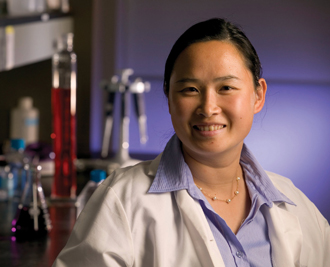Emily Ho Finds Anti-Cancer Mechanism in Broccoli
By wchung | 05 Feb, 2026
Emily Ho has identified a second way in which a compound found in cruciferous vegetables helps fight cancer tumor formation.
Oregon State University researcher Emily Ho has identified DNA methylation as a second cancer-producing epigenetic mechanism that can be neutralized by sulforaphane, a compound abundant in broccoli, kale and other cruciferous vegetables.
Epigenetics is the way diet, toxins and other factors influence which genes are expressed. The mechanism implicated in diseases like cancer, heart disease and other health issues.
Earlier epigenetics research had identified the ability to sulforaphane to regulate a family of enzymes called histone deacetylases (HDAC) which can interfere with the normal function of genes that suppress tumors.
Ho’s study found that sulforaphane also has a key regulatory effect on DNA methylation, a normal process of turning off genes that helps control what DNA material gets read as part of genetic communication within cells. The disruption of that process plays a crucial role in cancer.
“It appears that DNA methylation and HDAC inhibition, both of which can be influenced by sulforaphane, work in concert with each other to maintain proper cell function,” said Emily Ho, associate professor in the Linus Pauling Institute and the OSU College of Public Health and Human Sciences. “They sort of work as partners and talk to each other.”
“Cancer is very complex and it’s usually not just one thing that has gone wrong,” said Ho. “It’s increasingly clear that sulforaphane is a real multi-tasker. The more we find out about it, the more benefits it appears to have.”
Ho explored the influence of sulforaphane on DNA methylation by examining methylation of the gene cyclinD2, primarily with respect to prostate cancer cells. However, the same processes are thought central to other forms of cancer, including breast and colon cancers. These same disruptions also appear to play a role in other neurodegenerative diseases, including cardiovascular disease, immune function, neurodegenerative disease and even aging, adding even more significance to Ho’s discovery.
“With these processes the key is balance,” Ho said. “DNA methylation is a natural process, and when properly controlled is helpful. But when the balance gets mixed up it can cause havoc, and that’s where some of these critical nutrients are involved. They help restore the balance.”
Broccoli is the best source of sulforaphane, but the compound is also found in kale, cauliflower and other cruciferous vegetables. Long before sulfurophane’s role was fully understood, studies had shown that eating plenty of cruciferous vegetables helps prevent cancer.
Ho’s research was funded by the National Institutes of Health and the OSU Environmental Health Sciences Center. It was published in the journal Clinical Epigenetics.
Emily Ho graduated from the University of Guelph in Ontario canada in1995 with a bachelors in nutritional sciences. She received a PhD in nutrition in 2000 from Ohio State University. She was a postdoctoral fellow at UC Berkeley and the Children’s Hospital Oakland Research Institute from 2000 to 2003. She joined Oregon State University as an assistant professor in 2003 and became an associate professor in its department of nutrition and exercise sciences in 2008. Since 2003 she has been a principal investigator at the Linus Pauling Institute. In 2004 she also became a clinical assistant professor in the department of medicine, endocrinology & clinical nutrition at Oregon Health & Science University in Portland.
Her research focuses on antioxidants and gene expression and dietary chemoprevention strategies.
“I am currently interested in understanding the role of the antioxidant nutrients such as zinc in maintaining DNA integrity and cancer development,” she states. “Specifically, I am concerned with the effects of zinc status on DNA damage, DNA repair and stress-response signal pathways. We are also becoming interested in the effects of zinc on the immune system, especially as we age.”
Her lab has also focused on dietary approaches for prostate cancer prevention, including the molecular mechanisms by which foods like soy, tea and cruciferous vegetables may protect against prostate cancer.

Oregon State University professor Emily Ho has identified how eating broccoli can help regulate a mechanism that can prevent cancer tumors from forming.
Articles
- $1 Trillion Erased from Software Stocks on AI Fears
- Qualcomm, ARM to Suffer Sustained Slump on Memory Shortage for Cell Phones
- TSMC to Invest $17 Billion to Produce 3-nm Chips in Southern Japan
- Why the Silicon Chip Was Most Likely Inspired by UFO Debris
- The Transcontinental Railroad Owes a Huge Debt to Chinese Immigrants
Asian American Success Stories
- The 130 Most Inspiring Asian Americans of All Time
- 12 Most Brilliant Asian Americans
- Greatest Asian American War Heroes
- Asian American Digital Pioneers
- New Asian American Imagemakers
- Asian American Innovators
- The 20 Most Inspiring Asian Sports Stars
- 5 Most Daring Asian Americans
- Surprising Superstars
- TV’s Hottest Asians
- 100 Greatest Asian American Entrepreneurs
- Asian American Wonder Women
- Greatest Asian American Rags-to-Riches Stories
- Notable Asian American Professionals

